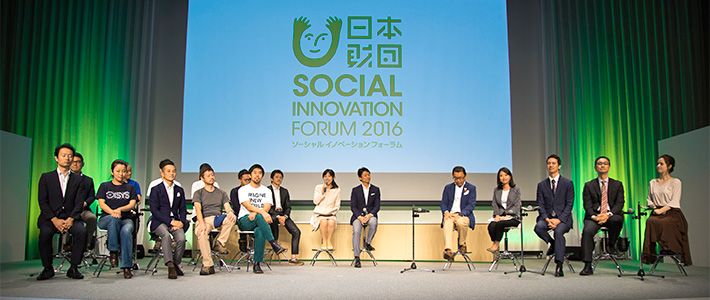
Forum Highlights Novel Approaches to Meeting Society’s Challenges
Society- English
- 日本語
- 简体字
- 繁體字
- Français
- Español
- العربية
- Русский
Nippon Foundation Social Innovation Forum 2016, held on September 28–30 at Toranomon Hills in Minato-ku, Tokyo, was an opportunity for social innovators to share their novel approaches to addressing Japan’s broad-ranging social challenges. Making onstage presentations at the forum were 11 representatives of 10 organizations—selected from hundreds of entries—that are offering particularly innovative solutions.
Three groups were chosen by forum participants to receive the Exceptional Social Innovator Prize, with the grand prize going to Iwamoto Yū for his organization’s school-centered community revitalization platform. The other recipients were Kawauchi Takanori and Kō Aki of the Collective for Children for their project to alleviate child poverty; and Hayashi Atsushi of Next Commons Lab for his pioneering initiative on post-capitalist workstyles.
Nippon Foundation Chairman Sasakawa Yōhei presented the three winners with a three-year social innovation grant of ¥100 million each.
Community-Building Efforts Centered on the School
In 2006 Iwamoto moved to Ama, a tiny, isolated island community of just 2,400 people in the Oki district of Shimane Prefecture, where he has worked with residents to transform the town’s only high school, Oki-Dōzen Senior High, into a pillar of community growth. Believing that people represented the future, he helped establish a program to provide students with the skills and ideas to support future entrepreneurial endeavors and has worked with local residents to establish a public preparatory school. Soliciting applicants from around the country, he has encouraged students from across Japan to study in Ama, turning the school into a national center for learning for a new generation of talented and driven young people.
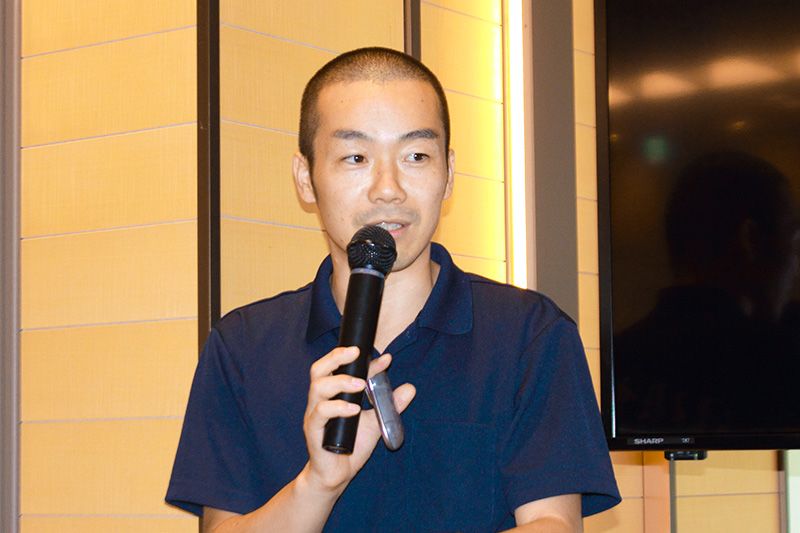 Exceptional Social Innovator grand prize winner Iwamoto Yū.
Exceptional Social Innovator grand prize winner Iwamoto Yū.
As a result, many of Ama’s junior high school graduates are now choosing to stay in Ama to attend the local high school, instead of commuting to schools in more populated areas, as was previously common. Hoping to enroll their children in this innovative school, families have also begun moving in to Ama, helping reverse the decline in student numbers and bringing the school back from the brink of closure. The town population, too, has begun to grow.
Iwamoto assigned coordinators to work with school administrators, municipal officials, and local residents to make the school more appealing, educate the next generation of local leaders, and revitalize the community. This “Ama model” has received attention from experts and policymakers around Japan, and since six years ago, the Shimane government has been applying this approach to schools in 19 regions across the prefecture.
Iwamoto currently serves as a special prefectural envoy overseeing the platform. At the Social Innovation Forum he explained that the successes and failures over the six years have helped fine-tune the program. The Ama model is now set to be rolled out broadly and will be introduced at 100 schools across Japan over the next three years. Iwamoto is also working to organize a Youth Innovation Olympics in September 2020 in a parallel event to the Tokyo Games that will bring together high school students from areas that have introduced the Ama model.
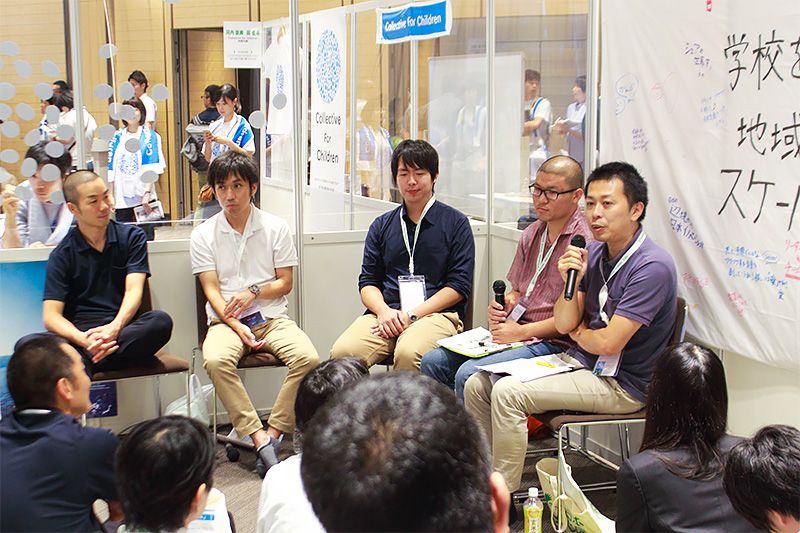 Iwamoto and other platform members take part in a discussion at the Social Innovation Forum.
Iwamoto and other platform members take part in a discussion at the Social Innovation Forum.
Japan’s Largest Social Innovation Event
The Nippon Foundation chose “creating Japan’s future” as the theme for its first Social Innovation Forum. In his opening remarks, Chairman Sasakawa commented, “Japan faces a diverse and increasingly complex range of social issues, from child poverty and child abuse to employment for people with disabilities and youth suicide. These cannot be addressed by the efforts of national and regional governments alone; we need a multi-sector approach.” He went on to express hope that the forum would serve as a platform to advance innovative public-private cooperative efforts to address social issues.
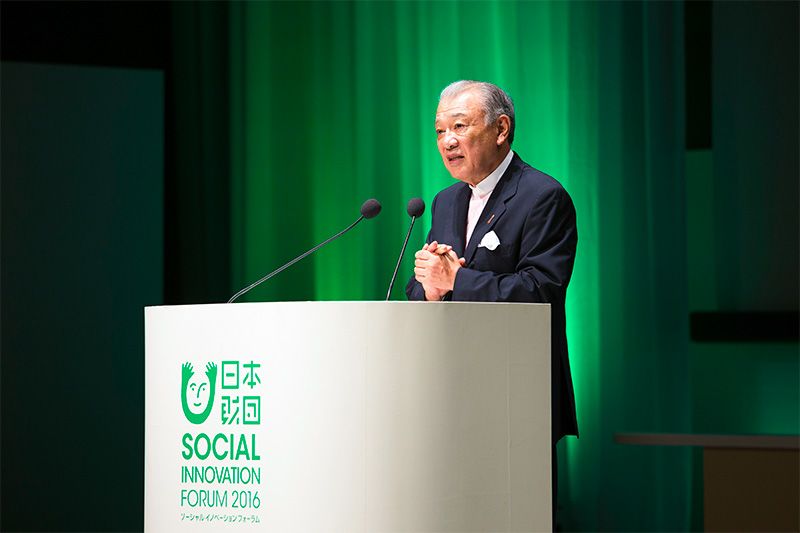 Nippon Foundation Chairman Sasakawa Yōhei gives the opening address.
Nippon Foundation Chairman Sasakawa Yōhei gives the opening address.
The keynote address was delivered by Koizumi Shinjirō, a member of the House of Representatives and son of former Prime Minister Koizumi Jun’ichirō. Drawing on his many personal encounters with social innovators, he noted that they are important changemakers capable of transforming society for the better. At the same time he stressed the need to come to terms with the reality of Japan’s declining population. He remained upbeat, though, saying that “an optimistic and confident population of 60 million is bound to be more innovative than a pessimistic nation of 120 million.”
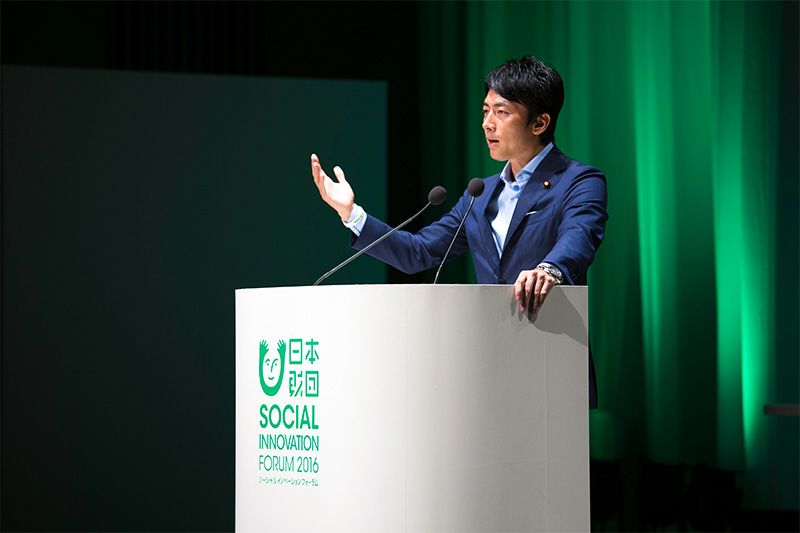 House of Representatives member Koizumi Shinjirō presents the keynote speech.
House of Representatives member Koizumi Shinjirō presents the keynote speech.
The forum was attended by over 2,100 people, making it largest social innovation gathering in Japan. In addition to presentations and Q&As by the 10 featured social innovation groups, over 30 seminars were conducted by experts, social entrepreneurs, and NPO members.
(Originally published in Japanese on October 3, 2016. Banner Photo: Japan’s leading social innovators (left) are introduced to forum participants on opening day of the three-day event.)